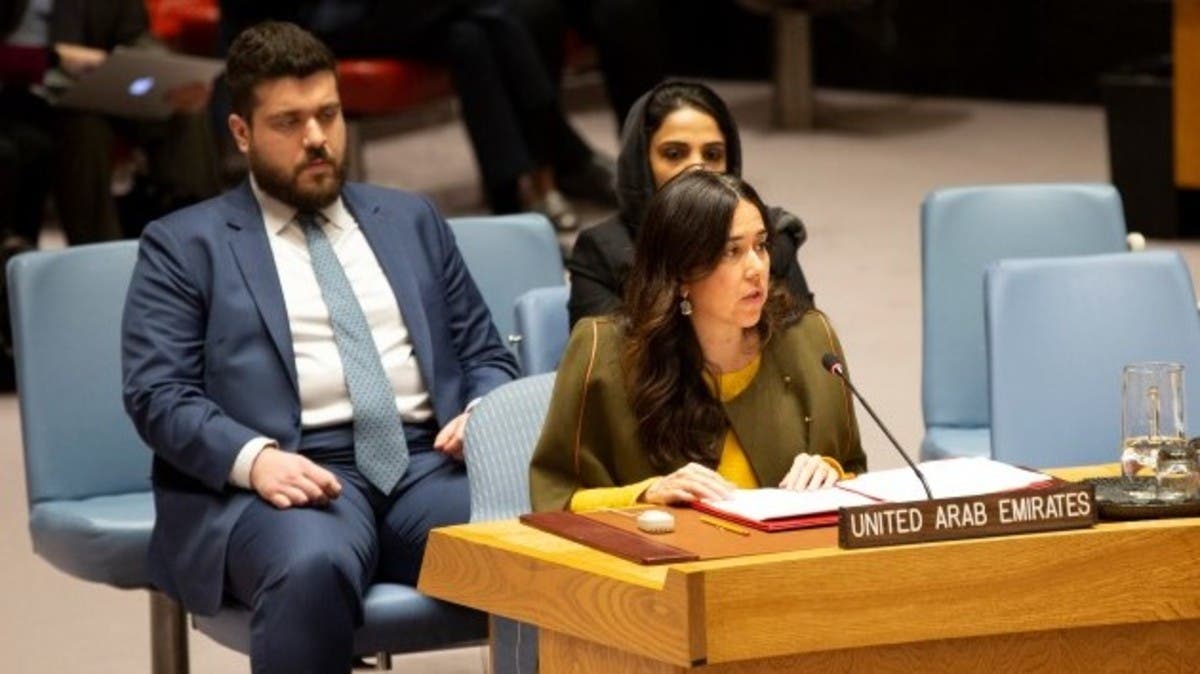The United Arab Emirates has called the alleged massacre of civilians in Bucha, Ukraine “shocking,” and an “alleged crime of utmost gravity” at a UN Security Council meeting on Ukraine on April 5.
The comments were made by the UAE Ambassador and Permanent Representative to the United Nations Lana Nusseibeh.
For the latest headlines, follow our Google News channel online or via the app.
The ambassador called on a cooperative investigation and urged people to “not get caught up in a war of narratives.”
She added that the UAE “acknowledges” the Secretary-General’s call for that independent investigation and the appointment of the Human Rights Council’s Independent International Commission of Inquiry on Ukraine in the council address.
Nusseibeh reiterated the need to “move towards a peaceful solution to the war in Ukraine.”
Bucha, 37 kilometers (23 miles) northwest of Kyiv, was occupied by Russian troops for more than a month following the February 24 invasion of Ukraine.
When the Russian forces pulled back last week, they reportedly left behind civilian dead on Bucha’s streets, inside buildings and buried in shallow graves.
Local officials say more than 300 people were killed by Russian forces in Bucha alone, and around 50 of them were executed, according to a Reuters report.
Growing numbers of Putin’s troops, along with mercenaries, have been reported moving into the Donbas, where Russia-backed separatists have fought Ukrainian forces for eight years and control two areas, the Associated Press reported.
Ahead of its February 24 invasion, Moscow recognized the Luhansk and Donetsk areas as independent states. Military analysts have said Putin also could be seeking to expand into government-controlled parts of the Donbas.
Ukrainian authorities are working to identify hundreds of bodies they say were found in Bucha and other towns after Russian troops withdrew and to document what they say were war crimes.
The ambassador requested that the council address relief and humanitarian needs including either “local or broad-based agreements for security guarantees to allow for the safe provision of humanitarian assistance and for civilians to voluntarily evacuate safely.”
On March 19, the UAE reiterated its commitment to providing assistance to civilians affected by Russia’s invasion of Ukraine during a phone call between the foreign ministers of UAE and Ukraine.
The UAE diplomat also reiterated the country’s “readiness” to support efforts being pursued to find a “peaceful solution to the dispute in Ukraine and to reach a political settlement to the crisis,” according to a WAM report.
Later on March 28, Abu Dhabi’s Mubadala Investment Company said it was pausing investments in Russia, which represent less than one percent of its portfolio, because of the Ukraine crisis.
That was the first comment by the top executive of Mubadala, Abu Dhabi’s second biggest sovereign fund, about its Russian investments after the invasion.
Nussebieh also touched upon the importance of preserving cultural heritage and identity, saying: “We know from our experience in the Middle East that protection of cultural sites is critical to rebuilding peace. In moments of violence and turmoil, cultural sites are essential cornerstones for collective memory and a foundation for future reconciliation.”
Global food shortages were also pointed out as a growing concern amid the war by the UAE representative, offering “full support” to the problem.
“Food shortages are aggravating situations already on this Council’s agenda, and these shortages are felt in other settings where high prices of basic commodities can lead to further unrest and instability, not just in this part of the world, but around the globe.
“We look forward to seeing the UN Global Crisis Response Group on Food, Energy and Finance address these issues and offer it our full support.”
The comment was reflected earlier by World Bank Managing Director of Development Policy and Partnerships Mari Pangestu, who said that The Middle East and North Africa region (MENA) is in a “critical” position with food and fuel as the Russia-Ukraine war continues to unfold, in an interview with Al Arabiya.
Wheat and other imports from Ukraine are said to be in peril from the Russian-initiated offensive, an area already under the radar from climate-change-induced droughts.
Read more:
Hungary receives nuclear fuel shipment from Russia by air
German ex-officials file war crimes complaint against Russia
Australia to impose sanctions, travel bans on 67 more Russian over Ukraine war

 World3 years ago
World3 years ago
 World3 years ago
World3 years ago
 Business11 months ago
Business11 months ago
 Entertainment7 years ago
Entertainment7 years ago
 World7 years ago
World7 years ago
 Entertainment7 years ago
Entertainment7 years ago






